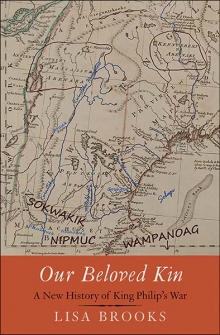The Centre for American Studies and the School of History at the University of Kent are delighted to announce this year’s Bolt Lecture on Thursday 22 November at 6.30pm in Grimond Building, Lecture Theatre 3. Entitled, Our Beloved Kin; War, Captivity and Native resistance during the ‘First Indian War’ the lecture will be given by Professor Lisa Brooks of Amherst College, Massachusettes.
All are welcome at this public lecture and a drinks reception beforehand at 5.45pm in the main foyer of Grimond Building.
Abstract of the lecture
Lisa Brooks recovers a complex picture of war, captivity, and Native resistance during the “First Indian War” (later named King Philip’s War) by relaying the stories of Weetamoo, a female Wampanoag leader, and James Printer, a Nipmuc scholar, whose stories converge in the captivity of Mary Rowlandson. Through both a narrow focus on Weetamoo, Printer, and their network of relations, and a far broader scope that includes vast Indigenous geographies, Brooks leads us to a new understanding of the history of colonial New England and of American origins. Brooks’s pathbreaking scholarship is grounded not just in extensive archival research but also in the land and communities of Native New England, reading the actions of actors during the seventeenth century alongside an analysis of the landscape and interpretations informed by tribal history.
Speaker biography
Lisa is currently a Professor at Amherst College. She teaches courses in Native American studies, early American literature and comparative American Studies. Before Amherst, she was John L. Loeb Associate Professor of the Humanities at Harvard University. As a writer, literary scholar and historian, Lisa works at the crossroads of early American literature & history, geography and Indigenous studies. In her writing and teaching, she asks questions about how we see the spaces known as “New England” and “America” when we turn the prism of our perception to divergent angles. Indigenous methodologies, including a focus on language, place, and community engagement, are crucial to her research, as is deep archival investigation.

